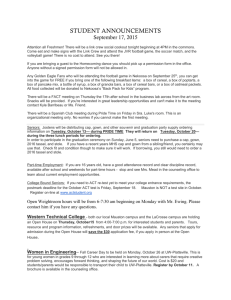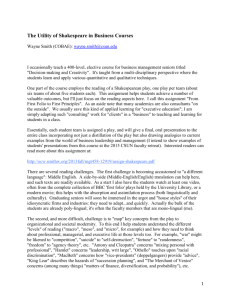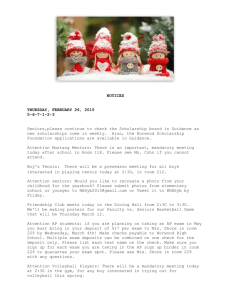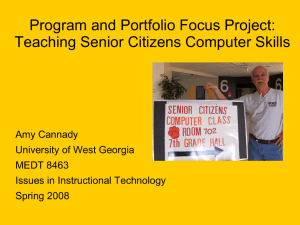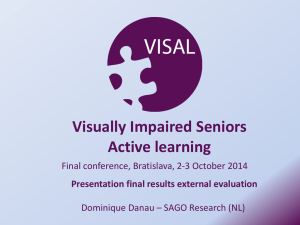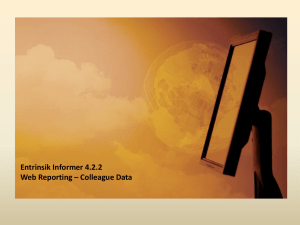Submission No 22 - Australian Human Rights Commission
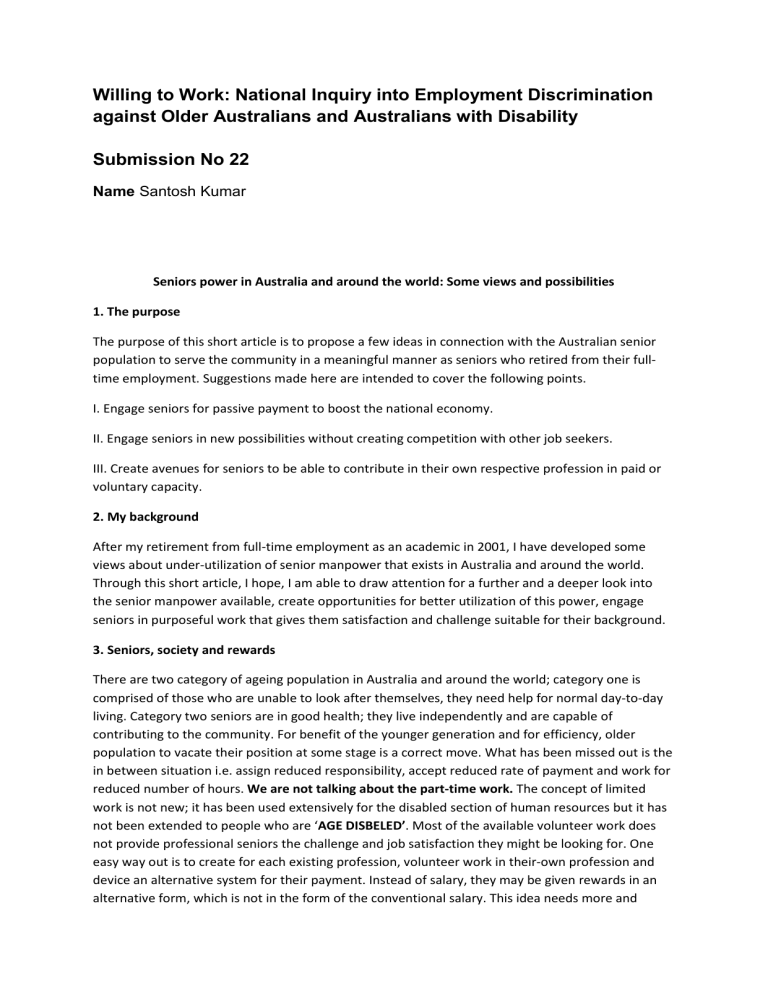
Willing to Work: National Inquiry into Employment Discrimination against Older Australians and Australians with Disability
Submission No 22
Name
Santosh Kumar
Seniors power in Australia and around the world: Some views and possibilities
1. The purpose
The purpose of this short article is to propose a few ideas in connection with the Australian senior population to serve the community in a meaningful manner as seniors who retired from their fulltime employment. Suggestions made here are intended to cover the following points.
I. Engage seniors for passive payment to boost the national economy.
II. Engage seniors in new possibilities without creating competition with other job seekers.
III. Create avenues for seniors to be able to contribute in their own respective profession in paid or voluntary capacity.
2. My background
After my retirement from full-time employment as an academic in 2001, I have developed some views about under-utilization of senior manpower that exists in Australia and around the world.
Through this short article, I hope, I am able to draw attention for a further and a deeper look into the senior manpower available, create opportunities for better utilization of this power, engage seniors in purposeful work that gives them satisfaction and challenge suitable for their background.
3. Seniors, society and rewards
There are two category of ageing population in Australia and around the world; category one is comprised of those who are unable to look after themselves, they need help for normal day-to-day living. Category two seniors are in good health; they live independently and are capable of contributing to the community. For benefit of the younger generation and for efficiency, older population to vacate their position at some stage is a correct move. What has been missed out is the in between situation i.e. assign reduced responsibility, accept reduced rate of payment and work for reduced number of hours. We are not talking about the part-time work. The concept of limited work is not new; it has been used extensively for the disabled section of human resources but it has not been extended to people who are ‘AGE DISBELED’. Most of the available volunteer work does not provide professional seniors the challenge and job satisfaction they might be looking for. One easy way out is to create for each existing profession, volunteer work in their-own profession and device an alternative system for their payment. Instead of salary, they may be given rewards in an alternative form, which is not in the form of the conventional salary. This idea needs more and
careful thinking but it can be done. I will explain my views of alternative payment form by an illustration, which I used in an academic environment.
3.1 An illustration of a reward in kind
In my earlier employment, once I found that research output at the university level, in my opinion,
(in my capacity as the Chairman, University Research Board) was low. To encourage the academic staff, I established a reward system for published work. This reward was funded by diverting some travel funds under the control of the Research Board for attending conferences. The staff on a successful publication didn’t get the agreed amount of money as part of their salary but their reward money was held by the Research Board for them to spend on their chosen academic expense. If a staff member had money in his account, he was able to use his money without any prior permission of the Research Board for his/her personal academic advancement. Thus staff did not see the additional income for their personal family use but only for their professional development pursuit.
This change was well received. I feel similar reward can be established for seniors for the work they do in their retirement and their earnings may be directed towards improving the national economy.
For example, reward money may be used towards travel or for a night out with family etc. One has to think areas where this readjustment may be possible.
4. Creation of new possibilities without creating competition with other job seekers.
Example 1: Terrorist attacks have impacted everyone’s life. Even radio advertisements funded by the
Govt. are now often appealing community to report suspicious activities. This current approach raises a question, how ordinary citizens can be effective against a well-organized criminal system?
Perhaps at very low salary and quick short training a senior group can be prepared as a passive network for being a guard against these criminal activities. Thus a network at a very low cost is possible with seniors help. ‘HOW CAN WE FIGHT AGAINST ORGANIZED CRIME IN AN
UNORGANIZED FASHION, WITH THE HELP OF UNTRAINED CIVILIANS MAKING OBSERVATIONS’?
Example 2: Keeping people longer in their own homes
Is possible only when a network of handypersons can be created in each neighbourhood for various handy work people used to do themselves in their younger days. It may be organized at a reasonable cost. Most jobs are not suited for a professional person and their fee is not justified for the work involved, for example to change a leaking washer or replacing an electric globe, one does not require a plumber or an electrician. Even a handyperson travelling long distance will not find work attractive. Hence handymen network is required in close vicinity of the point need may arises. The concept of ‘Bed-and-Breakfast’ in hotel industry and ‘Uber’ in taxi industry is good examples to address problems created by Hotel and Taxi industry in terms of cost associated with their product.
Time has come to create new concepts to look after the senior in their homes by creating a harmony network in each neighbourhood.
Similarly all other requirements of seniors have to be examined and answers provided.
5. Enable seniors to contribute in their chosen profession
Try and extend people’s professional career lease further relatively at a very low cast. This is already happening, for example, in the entertainment industry. Popular actors at certain stage move from
large screen to small screen. Similar to entertainment industry, we need to establish creatively similar small screens to absorb these keen professionals to continue sharing their professional skills for benefit of community. Examples are many:
Example: In many areas, for safety reasons, we have an additional person for discharging responsibility. For example, we have a co-pilot in flights, co-surgeon on major large operations etc.
These associates are intended to extend help and also accept the responsibility, if a need arises.
Standby arrangements will be desirable in many more industries but cost is prohibitive. With the help of seniors at low salary, the idea can be used more generously.
In 1974 the University of Southern California conducted an experiment by assigning two professors to the same class, one with a primary responsibility of teaching and the other as an observer. The experiment was unsuccessful as it was very expensive. I feel such an idea is workable with help of retired seniors at different wage level. More industries may like to examine duplication experiment in areas like road and air transport, teachers, etc. at minimum additional cost.
Similarly, from time to time, we also see a need to handle one-off time of work like enquiry into some specified direction may be handled by the seniors with proper qualifications and background.
Present voluntary work does not provide challenge for everyone to utilize their background, knowledge and experience. Since there is no payment for the voluntary work, therefore this kind of work does not have associated with it any accountability. Seniors do require mental challenge and work satisfaction. Thus an extension of lease in their own professional life without creating competition with the younger workforce will be welcome. It is good to quit from certain responsibilities but not altogether.
An illustration of improving text books
This particular illustration concerns education, but the concept described here can easily be generalized for wider applications.
The concept: All books (text and other reference materials) are a major source of building our nation’s tomorrow through our children, who will be managing Australia in future. Are we providing the right material in their hands? May be we are but only with regard to the particular subject that
book is intended for! This is a limited view in my opinion.
I understand some major producers and directors in film industry ask their manuscripts to be seen by many specialists before undertaking production of the film. These several persons examine the same script with different angles like: facts, hummer, dialogues, public appeal, lyrics and music etc.
Thus the public, at the end, gets a rich final product. The point is that the finished product in the film industry has a short self-life of single screening with respect to an individual, yet so much care goes into its development. Even if someone likes the film, he/she is not likely to revisit the same production many times.
However, our books in schools have longer shelf-life; they are used again and again for several years. Yet these books are judged only with respect to subject contents, i.e. subject material. These books can be improved if experts re-examine them from several other angles, which are equally important for the development of our children. For example:
1.
Subject material is the most important and is a prime requirement. Is one judgement enough? Would it be better if it is looked by more than one person?
2.
Material in the book should be judged with respect to fact stated in the book. Thus correctness is an important requirement, which needs to be looked at by another person.
3.
Books are intended to provide add on knowledge, i.e., they expect some background to understand them and also they prepare students for the next standard to be able to follow the course going to come in the next standard. Two separate persons should examine this requirement for smooth transition of students.
4.
Books should always have material a bit more than the requirement of that standard. For example, a good book should provide challenge to a bright student to maintain his/her interest alive. I am not sure if current books take care of this aspect. I am making this statement based on my own experience when a year 11 student asked me for help and I was surprised that the book did not provide sufficient information relating to the question coming from a student of that year.
These alternative requirements are not exhaustive but they are intended to make the point that subject matter alone is insufficient; the book must satisfy a few other requirements. This kind of tasks can be provided to senior brain powers to comment and final decision can rest with the author, publisher and may be the Education Department.
Before I conclude this illustration, may I also point out that in the financial world we do not trust a person or a team but several teams make investment decisions similarly it is desirable for a nation to make most important investment i.e. education is left in the hands of a few authors does not seem to be right. This is just one example of using senior brain power.
The above is a collection of few ideas but a real study in this direction can easily generate lot more useful ideas for using the senior brain power resource gainfully for the overall betterment of Australian citizens.
Dr Santosh Kumar
Retired Professor from RMIT University
Currently Honorary Academic Associate, University of Melbourne
